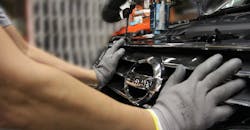Two of the largest transplant automakers are considering whether and how they might increase their U.S. outputs, in order to avoid the cost that vehicle and automotive parts tariffs may have on their performance in the U.S. market. The U.S. implemented a 25% tariff on imported passenger vehicles and light trucks on April 3, in a bid to force automakers to concentrate products for the market within the domestic supply chain.
A comparable 25% tariff is scheduled to be imposed on critical auto parts (e.g., engines, transmissions, powertrain parts, and electrical components) on May 3.
Both Honda Motor Co. and Nissan Motor Co. have signaled plans to avoid tariff costs by relocating assembly of vehicles from Mexico and/or Canada. In March it was reported Honda will assemble a new Civic hybrid vehicle in Greenville, Ind., starting in 2028, rather than in Guanajuato, Mexico.
Honda has not confirmed that shift, and in fact rejected the speculation in e-mailed statements published by Reuters.
"Honda has not made any production decisions that affect operations in Mexico, nor are any currently being considered," according to a Honda Mexico statement. And, "No changes are being considered at this time," Honda Canada stated.
But the possibility remains because of a Japanese news report this week confirming that the automaker will increase U.S. production as strategic reaction to the tariff program. That report stipulated Honda will move CR-V SUV production from Canada and restated the planned move of the HR-V SUV from Mexico to the U.S.
Nissan Motor’s intentions are a bit clearer. In a CNBC interview, Nissan Americas chairman Christian Meunier confirmed the automaker plans to maximize its U.S. production capacity. “We have big facilities, big capacities, and today we don’t have max capacity,” Meunier told the cable channel. “We still have more room to improve our capacity. We’re looking into selling more of the U.S. products, and adjusting, along the way, vehicles that are coming from Mexico and from Japan.”
He offered a specific example of the Smyrna, Tenn., assembly plant, which produced 314,500 vehicles in 2024, less than half its built capacity. “We’re looking at maxing out capacity and making Smyrna the powerhouse that it used to be,” he said.
Smyrna’s primary product is the Nissan Rogue crossover vehicle. In Mexico, Nissan assembles the Versa, Sentra, NP300, Kicks, and March, as well as the Infiniti QX50 and QX55. And it produces 2.0 liter engines for export at a separate plant in Mexico.
Between the Tennessee assembly plant and another in Canton, Miss. (Altima sedans, Frontier pickups), Nissan has capacity to assemble more than 1 million vehicles annually. Its engine plants are available to produce 1.4 million units, and it produces 1.4 million crankshafts and other forgings; and 456,000 engine blocks and heads, and other castings.
Meunier explained that Nissan has no specific plans for relocating production, but he made clear that \ changes will be evaluated.
“The good thing is, we have flexibility. We have an ability for us to accelerate, to do things faster than we would have normally,” Meunier said. “I was already working on it before the tariff, because I’m convinced that localization is the way.”
About the Author
Robert Brooks
Content Director
Robert Brooks has been a business-to-business reporter, writer, editor, and columnist for more than 20 years, specializing in the primary metal and basic manufacturing industries.
